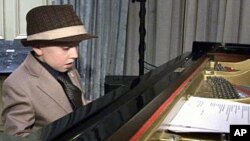Art and culture can often be effective instruments of global diplomacy. They can transcend political and economic differences, winning hearts and minds of people around the world. One of the most successful U.S. public diplomacy efforts of the late 20th century was a program known as the Jazz Ambassadors, and music today remains an important part of U.S. cultural outreach.
During the Cold War, jazz was a powerful instrument of American cultural diplomacy. It transformed superpower relations and helped shape the image of democracy in the world, especially for those living under Soviet communism and in eastern Europe. A U.S.-government-sponsored program sent jazz ambassadors around the world - among them such well-known musicians as Louis Armstrong, Dizzy Gillespie, Benny Goodman, Duke Ellington and Dave Brubeck.
From the 1950's to the 1970's, they toured more than 35 countries in the former Soviet Union, Eastern Europe, the Middle East, Africa and Asia. Their music dramatically influenced the perception of the United States, promoting a positive view of America and easing Cold-War tensions.
"No one travelled back then, especially if you think about normal people. Who in 1956 would get on an airplane and go to Burma or Thailand? It was just unheard of. Those were romantic locales for most people. So jazz ambassadors were really quite famous and were hailed as America's diplomats musically. The legacy that they left is still valid," Curtis Sandberg said.
Sandberg is vice president for the arts at the Meridian International Center, and the curator of an exhibit called Jam Session - a musicians' term for an impromptu performance. The exhibit, sponsored by the U.S. State Department, will travel to countries around the world over the next three years. It contains 100 photographs from 22 years of the Jazz Ambassadors program.
"These guys were remarkable," Sandberg said. "They braved dangers and sickness. Those were really tough tours. They were kept out very often for up to 3 months, under some pretty grueling conditions. They were heroes."
The legacy of the original Jazz Ambassadors still lives through a modern-day State department program called Rhythm Road, which blends different forms of music, from jazz and blues to Cajun and hip-hop. Its mission is to share America's unique contribution to the world of music and to promote cross-cultural understanding.
Maura Pally, the State Department's acting assistant secretary of Educational and Cultural Affairs, says cultural diplomacy remains extremely important in today's world. "Cultural diplomacy offers us a unique way to connect with people that we otherwise wouldn't. Art and music in particular transcends religious, political, and language divides in a way that nothing else does," she said.
Penny von Eschen is a History professor at the University of Michigan. She says cultural diplomacy should be a model for international relations in a world that has too often been overrun by wars and hostility. "It is a lesson to many countries to open up and have far more cultural exchange and make that a priority for diplomacy," she explained. "It remains as relevant today as it would have been in the 1950's and 60's."
As music remains an important part of U.S. public diplomacy, the newest generation of jazz musicians is coming to the stage. Nine-year-old Geoffrey Gallante started performing when he was five years old. He has played with the Duke Ellington Orchestra, and is the youngest jazz instrumentalist ever to perform at Washington's Kennedy Center for the Performing Arts and at the White House.
"I got to play with the president's own piano player," he recalled. "I did not play for President Bush, because I think he was on a trip to Iraq. It's a cool style of music and I want to keep doing it."
This new generation of jazz artists will continue to carry the torch of mutual understanding in the world - passed down by the original Jazz Ambassadors.




